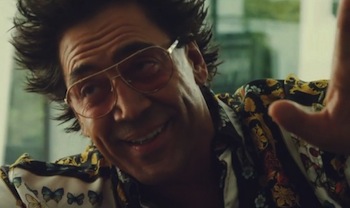Film Review: “The Counselor” — Filled with Dark and Troubling Poetry
Cormac McCarthy’s rambling but brilliant screenplay is given vigorous direction by Ridley Scott, whose elegant visual style captures the tense downward spiral of the film’s doomed characters.
The Counselor, directed by Ridley Scott. At cinemas around New England.
by Tim Jackson
In Cormac McCarthy’s violent 1985 novel Blood Meridian, Judge Holden, one of the leaders of a raping, murdering gang in 1847 on the border of Mexico and Texas, philosophizes, “If God meant to interfere in the degeneracy of mankind would he not have done so by now? Wolves cull themselves, man. What other creature could? And is the race of man not more predacious yet? The way of the world is to bloom and to flower and die but in the affairs of men there is no waning and the noon of his expression signals the onset of night. His spirit is exhausted at the peak of its achievement.” Whether you label the author a Gnostic, Nietzschean, or a nihilist, McCarthy’s first feature length screenplay reflects this pitiless vision of life: The Counselor will freeze you to the bone and leave a rictus on your face.
This western reflects a world of random cruelty, untempered by mercy, where wisdom comes only at lethal expense, and where atrocities beyond comprehension are the norm. Set in the Juarez border between Texas and Mexico, where the number of unsolved deaths of young women is soaring to frightening numbers, the storyline suggests that man is born into an evil world where moral lessons are ambiguous and transcendence is an illusion.
McCarthy’s rambling but brilliant screenplay is given vigorous direction by Ridley Scott, whose elegant visual style captures the tense downward spiral of the film’s doomed characters. From his earliest films, such as The Duelists, Alien, and Blade Runner, Scott has brought rich textures, elaborate visuals, and iconic characterizations to stories of people endlessly pursued by mysterious forces. In the current film, Michael Fassbender, known only as Counselor, dips into the Mexican drug trade for a quick profit. But once he’s in, out is not an option. Though many plot details are teasingly left to the imagination, the deal, we can assume, is facilitated by several of his more unsavory clients, who repeatedly warn him of the onset of danger.
McCarthy’s writing is so much richer than what is found in the ordinary “crime drama” that plot becomes secondary. He is more interested in inventing snazzy characters. Javier Bardem, in a reversal of his moping bad guy from No Country for Old Men, appears a Reiner, a gonzo club owner with hoodlum ties, a designer pad, and a hairdo that looks like he stuck his finger in a light socket. He knows the ways of the drug cartel and wants to believe that he’s in control, but deep down he knows he isn’t. He exudes a comic sense of doom that creeps to completion. Brad Pitt’s slippery wheeler-dealer Westray knows the merciless depths to which a cartel can sink; he doesn’t hesitate to share the most gruesome facts via his matter-of-fact, mid-western drawl. Pitt is particularly good at playing furtive and nervous losers, giving advice while checking the horizon for bad news.
Cameron Diaz, as Reiner’s predatory and voracious girlfriend Malkina, gets her kicks watching her pet leopards chase down rabbits in the desert as she sips cocktails under a portable canopy. It’s an apt image for both the relentless aims of the cartel and for her own slinky and lethal ambivalence toward everyone and everything. Penelope Cruz plays the sensuous and sexy Laura, the object of the Counselor’s romantic imagination. Unknowingly she is on her way to possibly becoming a blameless victim; she may also have had an affair with Malkina. Bruno Ganz puts in a quirky and understated performance as a perceptive diamond dealer. Dean Norris (so good as Hank Shrader in Breaking Bad) puts in a cameo as the drug buyer from Chicago, an ironic and appropriate nod to the popular TV show’s similar topic and dramatic arc.
What makes the movie so compelling is exactly what some viewers and critics may find off-putting. If you go looking to “figure out” the plot, you will be disappointed. McCarthy and Scott are more focused on drawing you into their world and its disconcerting randomness. They explore dark, sardonic contrasts of dread and sexual passion, privilege and desperation. There is a surprising lack of overt violence and no nudity. The elemental contrast is between men driven by their dreams and desire and a powerful, death-dealing, faceless cartel, capable of unimaginable acts of violence. The atmosphere of fear becomes so astonishingly threatening that you laugh at its audacity. We move from clean white bedroom sheets, beautiful bodies, and exquisite diamonds to sewer trucks, grubby smugglers, and generic, methodical hit men. Opulent clean minimalist spaces give way to endless stretches of dank garages and the cartel’s opulent mansions. A head is unceremoniously removed from a speeding motorcyclist using a piano wire stretched across the highway—in the next scene a cork pops from a champagne bottle (this sequence was reprinted in the June 10th issue of The New Yorker).
McCarthy has written ironic monologues that combine horrific humor, rambling stories, and a vaguely coherent if resolutely dour philosophy. In one brilliant moment Reiner vividly describes to the Counselor a sex act performed for him by Diaz’s Malkina, a hysterically graphic and disquieting performance that involves full splits on his car windshield. We don’t see the pornographic details, but we view the scene. “Why did you tell me that?,” Counselor asks. “I don’t know”, he replies, “Just forget it.” The Counselor responds, “You can’t just forget a thing like that.” The story rattles you with its incongruous combination of humor, sexuality, and grotesquery.
McCarthy has said: “Everything is necessary. Every least thing. This is the hard lesson. Nothing can be dispensed with. Nothing despised.” These are disturbing times and The Counselor dispenses some troubling lessons. But those willing to let its story build at its own pace, to appreciate the dark poetry of this wonderful collaboration, will reap great, though unsettling, rewards.
Tim Jackson is an assistant professor at the New England Institute of Art in the Digital Film and Video Department. His music career in Boston began in the 1970’s and includes some 20 groups, many recordings, national and international tours, and contributions to film soundtracks. He studied theater and English as an undergraduate and has also has worked helter skelter as an actor and member of SAG and AFTRA since the 1980’s. He has directed two documentaries: Chaos and Order: Making American Theater about the American Repertory Theater, and Radical Jesters, which profiles the practices of 11 interventionist artists and agit-prop performance groups. He is currently finishing a third documentary, When Things Go Wrong, about the Boston singer/songwriter Robin Lane with whom he has worked for 30 years. You can read more of his work on his blog.



I don’t want a rictus on my face.